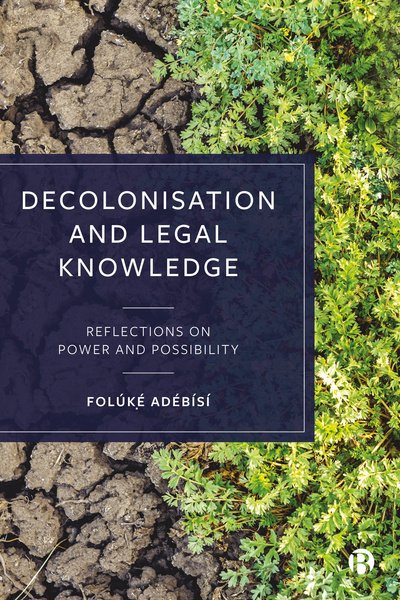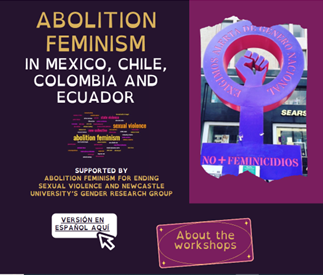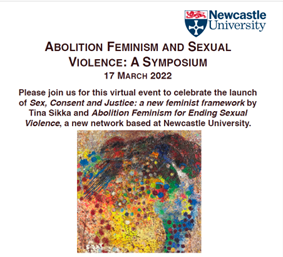
A strike that's changed the game? Exploring the future of feminist politics
On 3rd February 2025, Solace Women’s Aid made history when they announced that their staff had returned a 92% turnout and 100% vote in favour of an indefinite strike to stop devastating job cuts. In this online event you will hear from Solace workers who will reflect on the decision-making behind the strike, as well as leading thinkers on the topic of feminist gender-based violence politics including Leah Cowan, Tanya Serisier and molly ackhurst. Together they will explore what this strike means, for feminist politics and gender-based violence service provision in Britain.
Register here on a ‘pay what you feel’ basis - all proceeds to go to the Solace workers’ strike fund.

Whose Campus, Whose Security?
This online workshop, hosted by the Abolition Feminism for Ending Sexual Violence collective, focused on the report Whose campus, whose security? co-authored by Dr Remi Joseph-Salisbury and Dr Laura Connelly. The report provides the first empirical account of students’ views on, and experiences of, security services and police on UK university campuses. It draws on three datasets: a national survey of 635 students, regional interviews with 30 students and data obtained through Freedom of Information requests.
Watch the video at https://www.youtube.com/watch?v=cXRk01uz2Lc

Fiction, failure, and the anti-carceral imagination
Lecture by Phil Crockett Thomas, Newcastle University, September 2024, co-organised by the Abolition Feminism for Ending Sexual Violence Collective and the AHRC Network on Utopia and Failure.
Drawing on Tom Moylan’s conception of the ‘critical utopia’ (Moylan, 1986), this presentation focuses on how prison abolitionists use fiction to create spaces of hope, respite, and resistance in their ongoing struggle for abolition. To do so, this paper reflects on findings from Prison Break (2021-22), an interdisciplinary research project that used creative writing workshops to support UK-based activists and scholars involved in prison abolition and transformative justice to create ‘social science fiction’ (Theall, 1975) to help imagine and enact more just futures.
Watch the video at https://www.youtube.com/watch?v=nrVQleH7Yy4&t=143s

On Feminist Exhaustion
Abstract
Recent feminist, queer, trans, and sexuality studies work, alongside work in Black studies and critical ethnic studies, has rested on re-evaluating care– radical care, mutual aid, communities of care, care away from family unit, the medical industrial complex, the state, capitalism, and other infrastructural sites of remedy, remediation, restoration, and repair. While we welcome this revaluation of a core feminist tenant and its recovery from dismissal because of care’s feminization, we seek to rethink the generative role of exhaustion in feminist theory and feminist institutional practice.
Biographies
Jennifer C. Nash is the Jean Fox O'Barr Professor of Gender, Sexuality, and Feminist Studies at Duke University. She is the author of four books, most recently How We Write Now: Living With Black Feminist Theory (2024).
Samantha Pinto is Director of the Humanities Institute and Professor of English at the University of Texas at Austin. She is the author of Difficult Diasporas (NYU Press, 2013) and Infamous Bodies (Duke UP, 2020).
Watch the video at https://www.youtube.com/watch?v=rCzPL99nr3Q&t=48s.

Decolonising Feminist Publishing
Decolonising Feminist Publishing, by Srila Roy
Details
This talk will present a chapter from a book-in-progress, tentatively called Dissonant Intimacies: doing transnational feminism in the global South. While the bulk of the book concerns higher education in India and South Africa, this chapter turns to feminist decolonising imperatives operating out of the global North. I reflect on how the doing of transnational feminism at this scale might forge something beyond a reiteration of Western epistemic hierarchies and Northern institutional agendas around the production and circulation of feminist knowledge (or not).
Srila Roy is Professor of Sociology at the University of the Witwatersrand in Johannesburg. Her long-standing research and teaching expertise is in the area of transnational feminist studies. Her latest books are the co-edited, Intimacy and Injury: in the wake of #MeToo in India and South Africa (Manchester University Press, 2022) and the sole-authored, Changing the Subject: Feminist and Queer Politics in Neoliberal India (Duke University Press, 2022).
Watch the video at https://www.youtube.com/watch?v=eheaONPq18o

‘Imbroglio’ of Ecocide: A Political Economic Analysis'
The Abolition Feminism for Ending Sexual Violence Collective is hosting an online seminar by Eliana Cusato and Emily Jones on The ‘Imbroglio’ of Ecocide: A Political Economic Analysis', at 1-2pm, 11th December 2023, chaired by Christine Schwöbel-Patel. After the presentation there will be time for Q&As and a general discussion of abolition feminism and ecocide.
Eliana Cusato is an Assistant Professor of International Law at the Amsterdam Law School (UvA). Her research explores the interrelation of political ecology/economy, violence, and conflict in the theory and practice of international law.
Emily Jones is a NUAcT Fellow based in Newcastle Law School, Newcastle University. Emily is a generalist public international lawyer whose interdisciplinary work combines theory and practice.
Christine Schwöbel-Patel is Professor of Law at the University of Warwick and a Visiting Fellow at Cambridge University’s Centre for Research in the Arts, Social Sciences and Humanities (CRASSH).
Watch the video at https://www.youtube.com/watch?v=cK7kMuyLIyI&t=10s

Abolition Feminism in University Contexts
A second workshop convened and led by Erin Shannon, for researchers in the field to discuss thoughts about moving beyond the university (and the police) in responding to sexual violence in higher education, and to think about how we can collectively shape or influence research and practice to include more abolitionist thinking.

Abolition Feminism in University Contexts
Convened and led by Erin Shannon, a workshop for researchers in the field to discuss thoughts about moving beyond the university (and the police) in responding to sexual violence in higher education, and to think about how we can collectively shape or influence research and practice to include more abolitionist thinking.

Abolition Feminism and Pedagogy
Abolition Feminism and Pedagogy
4th May 2023, 1-2.30pm (BST) on Zoom
A launch of Folúkẹ́ Adébísí’s book Decolonisation and Legal Knowledge, followed by a discussion of abolition feminism and pedagogy facilitated by Nadine El-Enany, reflecting on what abolition feminism principles mean for our pedagogic practice, both within the university and without.
Professor Folúkẹ́ Adébísí is an Associate Professor at the University of Bristol Law School whose scholarship focuses on decolonial thought in legal education and its intersection with a history of changing ideas of the 'human.'
Dr Nadine El-Enany is Reader in Law at Birkbeck School of Law and Co-Director of the Centre for Research on Race and Law. She teaches and researches in the fields of migration and refugee law, European Union law, protest and criminal justice.

Art and popular political education to build alternative futures
Abolition Feminism in Mexico, Chile, Colombia and Ecuador: Workshop 3
Led by: Melany Cruz, Silvana Tapia Tapia and Laura Loyola-Hernández.
Latin American feminists have had a long tradition of activism and resistance against violence of all kinds, but especially violence against women, girls and sex-dissident communities.
By opening the conversation in these three workshops, we will learn from the knowledge and practice of Latin American feminists, which is a first step to start building spaces of shared struggles and ideas.
The collectives at this workshop:
Andrea Aguirre and Elizabeth Pino, Mujeres de Frente

Environmental abolition / my body, my first territory
Abolition Feminism in Mexico, Chile, Colombia and Ecuador: Workshop 2
Led by: Melany Cruz, Silvana Tapia Tapia and Laura Loyola-Hernández.
Latin American feminists have had a long tradition of activism and resistance against violence of all kinds, but especially violence against women, girls and sex-dissident communities.
By opening the conversation in these three workshops, we will learn from the knowledge and practice of Latin American feminists, which is a first step to start building spaces of shared struggles and ideas.
The collectives at this workshop:
Caroline Vilches, Modatima & Chile’s Constitutional Assembly
Environmental activists Lina Lucumí Mosquera and Mauri Balanta Jaramillo
Kristell Peche Oxte, K’Ajlay Collective

Immigration, carceral geographies and the role of technology in gender-based violence
Abolition Feminism in Mexico, Chile, Colombia and Ecuador: Workshop 1
Led by: Melany Cruz, Silvana Tapia Tapia and Laura Loyola-Hernández.
Latin American feminists have had a long tradition of activism and resistance against violence of all kinds, but especially violence against women, girls and sex-dissident communities.
By opening the conversation in these three workshops, we will learn from the knowledge and practice of Latin American feminists, which is a first step to start building spaces of shared struggles and ideas.
The collectives at this workshop:
Cristina Burneo Salazar, Corredores Migratorios
Marisol Hernández and Marcia Trejo, Colectivo Hermanas De La Sombra
Workshop website in English and Spanish.

Race to the Bottom: Reclaiming Antiracism - Book Reading & Discussion
A book reading and discussion of Azfar Shafi and Ilyas Nagee’s new book Race to the Bottom: Reclaiming Antiracism (2022).
Antiracist movements are more mainstream than ever before. Liberal democracies boast of their policies designed to stamp out racism in all walks of life. Why then is racism still ever-present in our society?
This is not an accident, but by design. Capitalism is structured by racism and has relentlessly attacked powerful movements. Race to the Bottom traces our current crisis back decades, to the fragmentation of Britain's Black Power movements and their absorption into NGOs and the Labour Party.
The authors call for recovering radical histories of antiracist struggle, championing modern activism and infusing them with the urgency of our times: replacing anxieties over 'unconscious bias' and rival claims for 'representation' with the struggle for a new, socialist, multi-racial organising from below.

Abolition Feminism and Sexual Violence: A Symposium
A celebration the publication of Sex, Consent and Justice: A New Feminist Framework for Ending Sexual Violence (2021), by Tina Sikka and the launch of the Abolition Feminism for Ending Sexual Violence Collective based at Newcastle University, UK.
